ملخصات السياسة
لا تؤثر جائحة كوفيد-١٩ على تجارة الأغذية وسلاسل الإمداد الغذائي والأسواق فحسب، بل تؤثر أيضًا على حياة البشر وسبل عيشهم وتغذيتهم.
تقدم هذه المجموعة من موجزات السياسات تقييماً نوعياً وكمياً لتأثيرات الوباء على هذه المجالات.
يتم إصدار ملخصات على أساس يومي. يرجى التحقق بشكل متكرر للحصول على أحدث .
للاستفسارات الإعلامية حول أي من المواضيع الواردة أدناه، يرجى التواصل مع: [email protected]
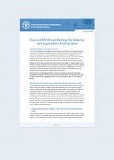
How is COVID-19 affecting the fisheries and aquaculture food systems
10/04/2020
The full range of activities required to deliver fish and fish products from production to the final consumer is subject to indirect impacts of the pandemic through new sanitary measures, changing consumer demands, market access or logistical problems related to transportation and border restrictions. This in turn has a damaging...
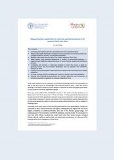
Safeguarding input supply chains for small-scale agricultural producers in the context of COVID-19 in Africa
05/05/2020
The African Centre for Disease Control and Prevention (Africa CDC) indicates that 52 AU Member States had reported positive cases of COVID-19 as of 7 April 2020. Consequently, governments have rapidly put in place measures to control the spread of the pandemic. Some of these measures are not fully aligned...
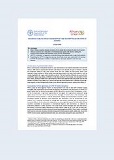
Intra-African trade, the African Continental Free Trade Area (AFCFTA) and the COVID-19 pandemic
05/05/2020
Africa’s participation in the global market for agri-food products has steadily expanded in the last half century, with exports growing by 4 percent and imports by 6 percent per year. However, exports are comprised mainly of cash crops (cocoa, fruits and nuts, coffee, tea and spices), which have relatively limited markets...
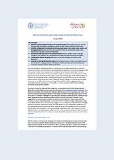
Measures for supporting domestic markets during the COVID-19 outbreak in Africa
05/05/2020
As COVID-19 reaches a growing number of communities across Africa, governments’ efforts to contain the spread of the virus need to be accompanied by measures to minimize disruptions to the food system. To date, the emerging crisis is viewed primarily through a public health lens (as it should) and only...
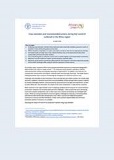
Crop calendars and recommended actions during the COVID-19 outbreak in the Africa region
05/05/2020
Many countries in the region already resort to adopting standard sets of measures for natural disasters or economic downturns to minimize food insecurity challenges. These include food price monitoring, food stock inventory assessments, but in other cases price controls and building up of strategic food stocks. Efforts are being undertaken...
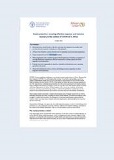
Social protection: ensuring effective response and inclusive recovery in the context of COVID-19 in Africa
05/05/2020
COVID-19 poses significant challenges to an already strained rural context in Africa. The growing direct impact of COVID-19 is affecting health, in terms of morbidity and mortality, as well as quickly overburdening health care services with negative repercussions for non-COVID related health problems, but even before COVID-19 had spread in...
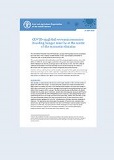
COVID-19 global economic recession: Avoiding hunger must be at the centre of the economic stimulus
06/05/2020
The scenario presented in this brief predicts that if the anticipated global recession, due to the effects of COVID-19, were to trigger a reduction in the growth rate of gross domestic product (GDP) of between two and ten percentage points in all countries in 2020, then the number of undernourished...
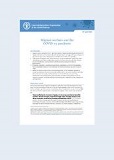
Migrant workers and the COVID-19 pandemic
06/05/2020
The policy brief reviews the impacts of the COVID-19 pandemic on migrants working in agri-food systems and their families in rural areas of origin. It points out some of the policy implications and presents key policy recommendations. Measures affecting the movement of people (internally and internationally) and resulting labour shortages,...
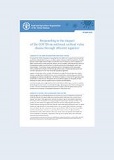
Responding to the impact of the COVID-19 outbreak on food value chains through efficient logistics
06/05/2020
Measures implemented around the world to contain the COVID-19 pandemic have entailed a severe reduction not only in the transportation of goods and services that rely on transport, but also in the migration of labour domestically and internationally. The Food and Agriculture Organization of the United Nations (FAO) urges countries to...
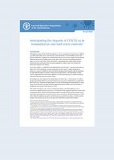
Anticipating the impacts of COVID-19 in humanitarian and food crisis contexts
06/05/2020
While the COVID-19 pandemic is devastating lives, public health systems, livelihoods and economies all over the world, populations living in food crisis contexts are particularly exposed to its effects. Countries with existing humanitarian crises are particularly exposed to the effects of the pandemic. The effects could be even stronger in countries...
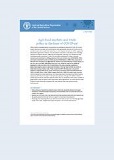
Agri-food markets and trade policy in the time of COVID-19
06/05/2020
The policy brief highlights that policy measures should aim to address actual rather than perceived demand and supply disruptions, and that enhanced market transparency, and coordination with trading partners is critical in this regard. It is noted that experiences from past crises have demonstrated that avoiding certain trade-restrictive measures can...
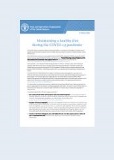
Maintaining a healthy diet during the COVID-19 pandemic
06/05/2020
The COVID-19 pandemic is causing many changes in the daily lives of people around the world, but there are things that can be done to maintain a healthy lifestyle in these difficult times. Everyone is encouraged to follow World Health Organization (WHO) guidance and governmental advice to protect against COVID-19...
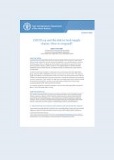
COVID-19 and the risk to food supply chains: How to respond?
06/05/2020
As the COVID-19 pandemic turns into a global crisis, countries are taking measures to contain the pandemic. Supermarket shelves remain stocked for now. But a protracted pandemic crisis could quickly put a strain on the food supply chains, which is a complex web of interactions involving farmers, agricultural inputs, processing plants,...
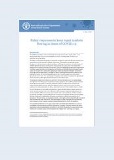
Policy responses to keep input markets flowing in times of COVID-19
11/05/2020
The COVID-19 pandemic poses a substantial risk to agricultural input supply chains. It can detrimentally affect access to and availability of inputs, including seeds, fertilizers and pesticides, as well as labour. As such, disruptions to the supply and demand of inputs will have diverse impacts across and within countries and...
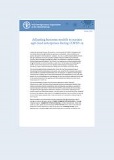
Adjusting business models to sustain agri-food enterprises during COVID-19
11/05/2020
Across the world the COVID-19 crisis is compromising agri-enterprises’ ability to continue business as usual and, in some cases, is threatening the survival of some firms beyond the crisis, particularly small businesses comprised of farm enterprises, traders, food manufacturers, distributors and retailers across food chains. The brief highlights the critical...
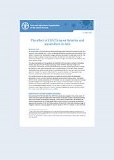
The effect of COVID-19 on fisheries and aquaculture in Asia
18/06/2020
On 10 April 2020, one month after the World Health Organization declared the spread of COVID-19 a pandemic, FAO published ‘How is COVID-19 affecting the fisheries and aquaculture food systems’ (FAO, 2020a). That policy brief, while global in scope, addressed the situation in some Asian countries. This paper provides an...
